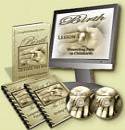The Benefits of
The Business of Being Born
An Interview with Abby Epstein, Director and
Producer of The Business of Being Born
Q: As a self-proclaimed homebirth skeptic before "The Business of Being Born" project, what eventually drew you to make this film?
A: I think I was first inspired by watching the video of Ricki's home birth. I had never seen anyone give birth like that in my life. She looked like a goddess in that bathtub! It completely re-wired my brain as to what the possibilities were for an amazing birth experience. Soon after, I read Ina May Gaskin's book Spiritual Midwifery and that sealed the deal. After that, I really understood that there were so many more aspects, layers, and gender politics around childbirth than I had ever imagined.
Q: Natural birth critics and anti-homebirth advocates contend that homebirth is an outdated approach that should be replaced with the technologies of today, stating that hospitals are better and safer because of the medications and emergency equipment available. How do you respond?
A: First and foremost I feel this is a matter of Choice. I would never advocate homebirth or even natural birth to any of my friends. I would only advocate they have as informed and empowered a birth as possible. This is a deeply personal choice that couples need to make on their own and its none of anyone's business to tell them what is 'safer' or 'better.' It's akin to the abortion issue in the sense that this is a reproductive right, where all mothers should have the right to choose where they feel safest giving birth. The statistics just do not exist to say that hospital birth is safer. In fact, the studies show the opposite – that homebirth is just as safe as hospital birth for low-risk women. So we need to pay attention to the studies that are published in medical and midwifery journals and not use fear tactics and anecdotal evidence to discourage homebirth because it frightens some people or adds competition to the marketplace.
Q: What are some of the reasons you discovered women choose homebirth with a midwife over hospital birth?
A: I think many women had their first child in a hospital setting and either had an unsatisfying experience, or just felt confident enough in the process that they wanted to birth at home the second time around. I think the personalities of many of the homebirth mothers I meet are very confident and 'take charge.' They trust their bodies on an intuitive level and many also feel that a homebirth will be the safest and gentlest experience for their newborns. Also, I think that women who have homebirths with a midwife are usually totally transformed and empowered by the experience. They did not expect it to be as life-changing as it was.
Q: Did your pregnancy affect the direction of "The Business of Being Born"?
A: My pregnancy was only included in the film on a lark – at the suggestion of my editor. I was very much against it, as I didn't see what the director's birth story was going to add to a film already full of great birth stories.
But when my birth became the 'exception to the rule' dramatic experience that it was, we knew we had to include it to balance out the film. We wanted to show the importance of the medical and midwifery models working together.
Q: How did you decide which births to include in the final cut of the film?
A: This was very difficult and a few were omitted because we had too many characters!
Q: Once you went into preterm labor, did the knowledge you gained during your work on "The Business of Being Born" affect your response to the medical care you received?
A: The knowledge I had gained during the making of the film was so invaluable that I don't know how anyone has a baby without doing all the preparation that I did! (Especially seeing a few live births firsthand) So, I was never frightened. I knew exactly what was happening at every moment. I knew we were in amazing hands at home and in the hospital and that we were never in any danger. (Except maybe for the taxi cab ride!) Several people who had babies after seeing the film, also told me that they felt the same way. They felt very empowered to become participants in their own births.
Q: As I'm sure you're aware, the AMA recently backed ACOG with a resolution to draft anti-homebirth legislation, asserting hospitals are the safest place to give birth, even referencing your work in their first draft. What is your response?
A: You know, I find it very sad and desperate that such noble organizations who are supposed to have women's healthcare as their first priority would waste their precious time and energy on such a petty turf war. When you think of all the problems facing our maternity care system and the overwhelming amount of uninsured, the growing premature birth rates, the terrible infant mortality stats, the disappearance of VBAC, etc... It's amazing they would put so much energy into the less than 1% of mothers giving birth at home. These mothers and midwives will continue to birth at home whether it's legal or not, so by threatening legislation they are going to push homebirth into the 'back alley abortion' territory and move this country backwards instead of working WITH the midwives on licensure to make birth safer for all women and babies. But they are fighting an economic battle here and I find it very sad. I see great hope and compassion in the new generation of medical students and doctors who support our film and I think that eventually this new generation will rise above the hundred-year-old competition and fear of midwives that dominate the current medical profession.
Q: What do you hope people will take away from "The Business of Being Born"?
A: I just hope people will re-examine all their fear-based assumptions about birth, like I did. I hope they will see birth as a joyful, powerful experience and open their eyes to all the different options available to them.
Q: What type of changes would you most like to see implemented in the course of modern maternity care practices?
A: I would like to see midwives integrated into the system more autonomously. I would like to see more obstetricians backing up midwives and supporting natural deliveries. I would like to see more birth centers opening all over the country. I would like to see insurance carriers reimbursing midwives equally to doctors for doing the same job better and more cheaply. I would like to see the malpractice crisis resolve itself somehow so that doctors and midwives don't have to work everyday with a lawyer looking over their shoulders, worrying that every medical decision can be defended in a court of law.
Q: Finally, can you tell us a little bit about any forthcoming projects?
A: Ricki and I have a book coming out next May called YOUR BEST BIRTH, which will be a wonderful practical guide to planning your birth. We are also working on a follow-up DVD to 'The Business of Being Born,' which should be completed by next spring.
If you haven't yet had the chance to see "The Business of Being Born", you can rent it on Netflix. Also, dvd copies of The Business of Being Born are still available for purchase directly from TheBusinessofBeingBorn.com
Return from Interview with Abby Epstein to The Business of Being Born
Return to Giving Birth Naturally Home
Page Last Modified by Catherine Beier, MS, CBE
Most Popular
How to Use Acupressure to Induce Labor
Childbirth Relaxation Script MP3s
Nutrition During Pregnancy - Nix the Notion of Eating for Two
Looking for a Birth Professional? Search our Provider Directory
Online Childbirth Classes
Choose 7 week, 12 week, or Self- Paced online childbirth classes available wherever and whenever you need them.
Featured Birth Story
Vanessa's natural birth story shows that when birth is left alone to proceed as it should, it waits for no one - not even doctors or midwives.
Free Pregnancy Tickers
Create a free pregnancy ticker to post on your blog, website, Facebook profile or favorite social media...




